Design decisions for buildings and communities are critical to efforts to increase local and regional resiliency. Building designers — of residential, institutional, and commercial structures — should strive to incorporate passive and active survivability concepts into new and renovated structures.
Community planners and developers need to incorporate concepts that increase the capacity to maintain transportation flow, strategies to handle water management, and infrastructure approaches that will withstand a variety of risks.
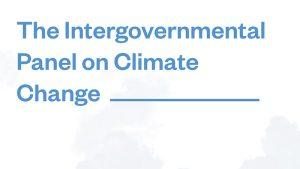
2022 IPCC
The Intergovernmental Panel on Climate Change’s official website provides reports, information on its working groups, activities, news, and updated calendar.
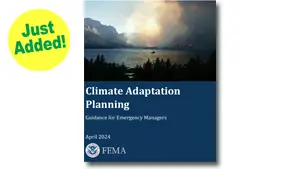
Climate Adaptation Planning: Guidance for Emergency Managers
FEMA’s Climate Adaption Planning: Guidance for Emergency Managers is intended to help state, local, tribal, and territorial (SLTT) emergency managers incorporate climate adaptation into emergency management planning efforts.
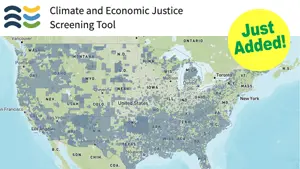
Climate and Economic Justice Screening Tool
The Climate and Economic Justice Screening Tool from the Council on Environmental Quality features an interactive map and uses datasets that are indicators of burdens in eight categories: climate change, energy, health, housing, legacy pollution, transportation, water and wastewater, and workforce development.
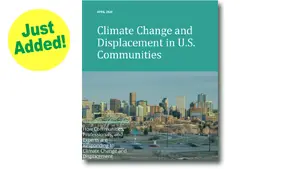
Climate Change and Displacement in U.S. Communities
EcoAdapt conducted a survey with the Strong, Prosperous, and Resilient Communities Challenge to determine if and how people working to address displacement pressures are considering the effects of climate change. This survey is part of a broader project in collaboration with the Urban Displacement Project to better understand the intersections between climate change and displacement pressures.
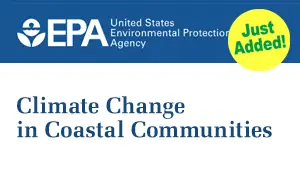
Climate Change in Coastal Communities
US EPA maintains a website that focuses on essential information for coastal communities planning for the effects of climate change.
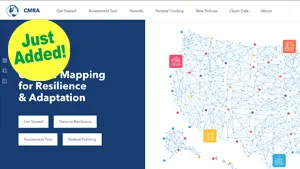
Climate Mapping for Resilience and Adaptation
The U.S. Climate Resilience Toolkit offers a framework to help communities systematically consider and address their climate hazards.
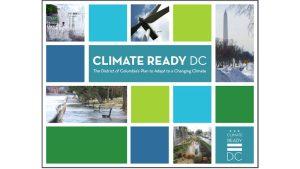
Climate Ready DC: The District of Columbia’s Plan to Adapt to a Changing Climate
Climate Ready DC is the District of Columbia’s strategy to make the District more resilient to future climate change while helping to ensure that our city continues to grow greener, healthier, and more livable.
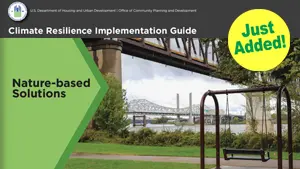
Climate Resilience Implementation Guide: Nature-based Solutions
The Climate Resilience Implementation Guide provides step-by-step instructions to assist communities in implementing nature-based solutions. Grantees are encouraged to use this Guide for suggestions on how to effectively use Community Planning and Development (CPD)-funded programs and other resources to design and implement nature-based solutions.
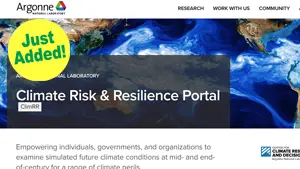
Climate Risk & Resilience Portal (ClimRR)
The Climate Risk & Resilience Portal from Argonne National Laboratory empowers individuals, governments, and organizations to examine simulated future climate conditions at mid- and end-of-century for a range of climate perils.

Climate Security: The American Security Project
The ASP’s climate security page focuses on key risks/hazards, with particular interest in how they directly impact U.S. military readiness, operations, training, and resilience

2022 IPCC
The Intergovernmental Panel on Climate Change’s official website provides reports, information on its working groups, activities, news, and updated calendar.

Climate Adaptation Planning: Guidance for Emergency Managers
FEMA’s Climate Adaption Planning: Guidance for Emergency Managers is intended to help state, local, tribal, and territorial (SLTT) emergency managers incorporate climate adaptation into emergency management planning efforts.

Climate and Economic Justice Screening Tool
The Climate and Economic Justice Screening Tool from the Council on Environmental Quality features an interactive map and uses datasets that are indicators of burdens in eight categories: climate change, energy, health, housing, legacy pollution, transportation, water and wastewater, and workforce development.

Climate Change and Displacement in U.S. Communities
EcoAdapt conducted a survey with the Strong, Prosperous, and Resilient Communities Challenge to determine if and how people working to address displacement pressures are considering the effects of climate change. This survey is part of a broader project in collaboration with the Urban Displacement Project to better understand the intersections between climate change and displacement pressures.

Climate Change in Coastal Communities
US EPA maintains a website that focuses on essential information for coastal communities planning for the effects of climate change.

Climate Mapping for Resilience and Adaptation
The U.S. Climate Resilience Toolkit offers a framework to help communities systematically consider and address their climate hazards.

Climate Ready DC: The District of Columbia’s Plan to Adapt to a Changing Climate
Climate Ready DC is the District of Columbia’s strategy to make the District more resilient to future climate change while helping to ensure that our city continues to grow greener, healthier, and more livable.

Climate Resilience Implementation Guide: Nature-based Solutions
The Climate Resilience Implementation Guide provides step-by-step instructions to assist communities in implementing nature-based solutions. Grantees are encouraged to use this Guide for suggestions on how to effectively use Community Planning and Development (CPD)-funded programs and other resources to design and implement nature-based solutions.

Climate Risk & Resilience Portal (ClimRR)
The Climate Risk & Resilience Portal from Argonne National Laboratory empowers individuals, governments, and organizations to examine simulated future climate conditions at mid- and end-of-century for a range of climate perils.

Climate Security: The American Security Project
The ASP’s climate security page focuses on key risks/hazards, with particular interest in how they directly impact U.S. military readiness, operations, training, and resilience
